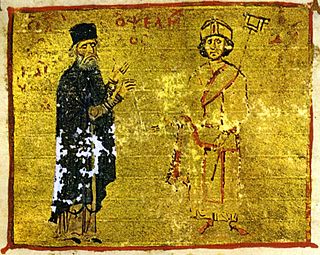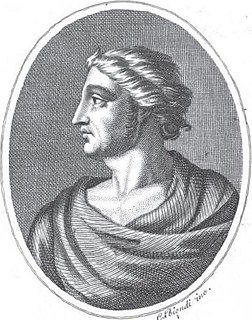Lesbonax of Mytilene (Greek : Λεσβώναξ ὁ Μυτιληναῖος), a Greek sophist and rhetorician, flourished in the time of Caesar Augustus. According to Photius I of Constantinople he was the author of sixteen political speeches, of which two are extant, a hortatory speech after the style of Thucydides, and a speech on the Corinthian War. In the first he exhorts the Athenians against the Spartans, in the second (the title of which is misleading) against the Thebans (edition by F. Kiehr, Lesbonactis sophistae quae supersunt (Leipzig 1906). Some erotic letters are also attributed to him. His son Potamo was also a notable rhetorician.

Mytilene is a city founded in the 11th century BC. Mytilene is the capital city and port of the island of Lesbos and also the capital of the North Aegean Region. The seat of the governor of the North Aegean Region is Mytilene. Mytilene is also one of 13 municipalities (counties) on the island of Lesbos. Mytilene is built on the southeast edge of the island. It is also the seat of a metropolitan bishop of the Eastern Orthodox Church.

Greek is an independent branch of the Indo-European family of languages, native to Greece, Cyprus and other parts of the Eastern Mediterranean and the Black Sea. It has the longest documented history of any living Indo-European language, spanning more than 3000 years of written records. Its writing system has been the Greek alphabet for the major part of its history; other systems, such as Linear B and the Cypriot syllabary, were used previously. The alphabet arose from the Phoenician script and was in turn the basis of the Latin, Cyrillic, Armenian, Coptic, Gothic, and many other writing systems.

Ancient Greece was a civilization belonging to a period of Greek history from the Greek Dark Ages of the 12th–9th centuries BC to the end of antiquity. Immediately following this period was the beginning of the Early Middle Ages and the Byzantine era. Roughly three centuries after the Late Bronze Age collapse of Mycenaean Greece, Greek urban poleis began to form in the 8th century BC, ushering in the Archaic period and colonization of the Mediterranean Basin. This was followed by the period of Classical Greece, an era that began with the Greco-Persian Wars, lasting from the 5th to 4th centuries BC. Due to the conquests by Alexander the Great of Macedon, Hellenistic civilization flourished from Central Asia to the western end of the Mediterranean Sea. The Hellenistic period came to an end with the conquests and annexations of the eastern Mediterranean world by the Roman Republic, which established the Roman province of Macedonia in Roman Greece, and later the province of Achaea during the Roman Empire.
The Lesbonax described in the Suda as the author of a large number of philosophical works is probably of much earlier date; [1] on the other hand, the author of a small treatise on grammatical figures (ed. Rudolf Müller, Leipzig, 1900), is probably later.

The Suda or Souda is a large 10th-century Byzantine encyclopedia of the ancient Mediterranean world, formerly attributed to an author called Soudas (Σούδας) or Souidas (Σουίδας). It is an encyclopedic lexicon, written in Greek, with 30,000 entries, many drawing from ancient sources that have since been lost, and often derived from medieval Christian compilers. The derivation is probably from the Byzantine Greek word souda, meaning "fortress" or "stronghold", with the alternate name, Suidas, stemming from an error made by Eustathius, who mistook the title for the author's name.


